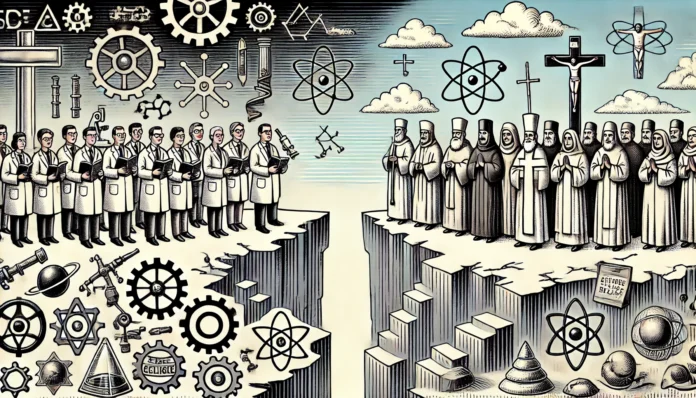Science vs Religion: An Atheist Perspective on the Conflict
The relationship between science and religion has been a subject of debate for centuries. From the trial of Galileo to the modern-day controversies over evolution and climate change, the tension between evidence-based inquiry and faith-based belief continues to shape public discourse. For atheists, this conflict is not just academic—it is central to understanding how we interpret the world and make decisions that affect society as a whole.
The Roots of the Conflict
At its core, the conflict between science and religion arises from fundamentally different approaches to knowledge. Science relies on empirical evidence, testable hypotheses, and the willingness to revise beliefs in light of new data. Religion, on the other hand, often depends on faith, tradition, and the acceptance of supernatural explanations. This divergence is especially pronounced when scientific discoveries challenge long-held religious doctrines.
Evolution: A Case Study in Controversy
Perhaps no topic better illustrates the science-religion divide than the theory of evolution. Since Charles Darwin published On the Origin of Species in 1859, the idea that all life shares a common ancestry has been supported by overwhelming evidence from genetics, paleontology, and comparative anatomy. Yet, according to a 2021 Pew Research Center survey, a significant portion of Americans still reject evolution, often citing religious beliefs as the reason.
Organizations like the National Center for Science Education (NCSE) work tirelessly to promote accurate science education and counteract misinformation. Despite these efforts, the teaching of evolution remains contentious in many school districts, with some states attempting to introduce creationism or “intelligent design” into science curricula. This ongoing battle underscores the deep-seated resistance to scientific explanations that contradict religious narratives.
The Origin of the Universe: Science vs. Creation Myths
The question of how the universe began is another flashpoint. The Big Bang theory, supported by extensive astronomical observations, provides a naturalistic explanation for the origin and evolution of the cosmos. In contrast, many religious traditions offer creation stories that attribute the universe’s existence to a divine being. While some believers attempt to reconcile these accounts, others see them as mutually exclusive.
Recent advances in cosmology, such as the discovery of cosmic microwave background radiation and the accelerating expansion of the universe, have only strengthened the scientific case. Yet, as noted by the Pew Research Center, a substantial number of people continue to view scientific and religious explanations as incompatible.
Miracles and the Supernatural
Miracles—events that defy natural laws—are central to many religious traditions. From the resurrection of Jesus to modern claims of faith healing, such stories are often cited as evidence of the divine. However, from a scientific perspective, extraordinary claims require extraordinary evidence. To date, there is no verifiable, peer-reviewed evidence supporting the occurrence of miracles. As the NCSE and other organizations emphasize, anecdotal reports and personal testimonies do not meet the rigorous standards of scientific proof.
Can Science and Religion Harmonize?
Some argue that science and religion address different realms—science explains the “how,” while religion addresses the “why.” This view, known as non-overlapping magisteria, suggests that conflict is unnecessary. However, in practice, religious claims often make assertions about the natural world that can be tested—and frequently contradicted—by science.
For example, the age of the Earth, the development of life, and the efficacy of prayer are all subjects where scientific investigation has yielded answers that differ from traditional religious teachings. Attempts to harmonize these differences often require reinterpreting or abandoning core tenets of faith, which can be deeply unsettling for believers.
The Societal Impact of the Science-Religion Divide
The conflict between science and religion is not just theoretical—it has real-world consequences. Debates over evolution, climate change, and public health measures like vaccination are often influenced by religious beliefs. According to the Pew Research Center, religious affiliation can significantly affect attitudes toward scientific issues, sometimes leading to resistance against evidence-based policies.
This resistance can hinder scientific progress and public understanding. For instance, the rejection of evolution and climate science in some communities has led to educational gaps and policy decisions that undermine efforts to address global challenges. As the NCSE points out, promoting scientific literacy is essential for informed citizenship and effective problem-solving.
Advocating for a Science-Based Worldview
From an atheist perspective, the solution is clear: society should prioritize evidence-based reasoning over faith-based assertions. This does not mean dismissing the personal or cultural significance of religious traditions, but it does require recognizing the limits of faith as a guide to understanding the natural world.
Embracing a scientific worldview means valuing skepticism, critical thinking, and the willingness to change one’s mind in the face of new evidence. It means supporting science education, defending the integrity of scientific research, and challenging misinformation—regardless of its source.
Looking Forward
The conflict between science and religion is unlikely to disappear anytime soon. However, by fostering a culture that values evidence and reason, we can help ensure that public policy and education are guided by the best available knowledge. As new discoveries continue to expand our understanding of the universe, the case for a science-based worldview grows ever stronger.
For more information, visit the Pew Research Center and the National Center for Science Education.

